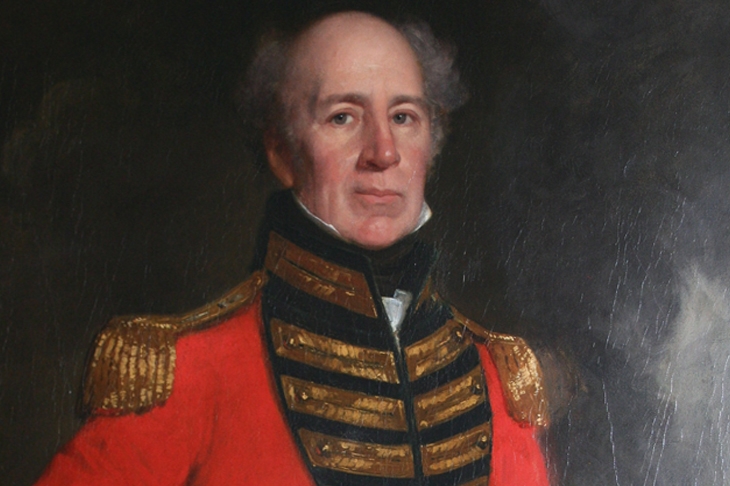Accounts of the founding of the British Empire once echoed the pages of Boy’s Own, featuring visionaries, armed with a flag, a faith and a funny hat, arriving in exotic lands untouched by civilisation. Overcoming great odds, they would kick-start the regions’ histories, show the locals the proper way to live and extend the imperial pink on the map a few inches before sailing off into the history books. Cook in Australia, Rhodes in Africa, Clive in India: in the popular imagination, the Empire was built by remarkable men, all by themselves.
Singapore was no exception — and the myth endures to this day. Stamford Rafflescontinues to dominate its pedestals, revered as the inspired founder who built an international trading enclave from the island swamp at the foot of the Malay peninsula where he disembarked in 1819.
Into this dusty tale Nadia Wright throws a much-needed stick of revisionist dynamite. Raffles is here portrayed as a reckless, inept opportunist, a bully and a hypocrite, who stole the crown from the man actually responsible for building the entrepot. Spare a thought for Raffles’s second-in-command, a tall, gentle Scotsman named William Farquhar.
Most versions place Farquhar at the margins of the story, presenting him as the bumbling, incompetent caretaker of Raffles’s brainchild for the first three years of the territory’s history, wandering around in military uniform with his stick and his dogs. But without him, Wright argues, Singapore would never have survived.
Although some new research has allowed Farquhar a greater role, Wright goes into unprecedented detail in this respect, having sifted through piles of East India Company documents to unearth the truth. Farquhar, it is immediately obvious, was far from incompetent. In his previous post as commandant of Malacca, he had only been expected to oversee this Dutch possession while the Netherlands were occupied by Napoleon. Yet he managed to turn around the Malay state and its capital entirely, creating substantial profits after years of losses.
The great range of merchants who traded there — Arab, Indian, Chinese, Malay and European — affectionately knew him as the ‘Rajah of Malacca’; and news that Farquhar was to run the show in Singapore in the early 1820s gave more than 5,000 of these merchants the confidence to leave their homes in Malacca and risk settling in the fledgling trading post. So concerned were the Dutch, they even blockaded the harbour to prevent a mass exodus.
Farquhar’s secret in both settlements was to co-operate closely with the local population, using his expert knowledge of Malay culture and politics developed over 25 years in the East. He promoted trading relations by networking with the different communities of south-east Asia and often acted as a cultural go-between, explaining to the British why certain actions in Malacca would upset the Malays and suggesting diplomatic alternatives. He did everything possible to make Singapore appeal to local traders, even permitting gambling and opium dens, provided a licence was paid — which ended up funding the Singapore police.
That Farquhar’s role has been neglected for so long is extraordinary. But the more remarkable part of the story is that Singapore exists at all. From the start, Raffles did not inspire confidence. Singapore was considered just one in a long line of failed settlements that he had attempted to found in the South China Sea. His superiors in the East India Company despaired of anything he touched, and refused to back the project. He had caused diplomatic headaches in the past by trying to settle in Dutch territory, and his spell as lieutenant- governor of Java between 1811 and 1816 had haemorrhaged money. To one frustrated colleague he was ‘a man who sets a house on fire, and then runs away’.
When Raffles departed Singapore a few months after his arrival in 1819, he left Farquhar understaffed, underfunded and under-stocked, having issued hopelessly impractical orders to be carried out in his absence. Farquhar was directed to obtain supplies from Raffles’s command post six weeks’ journey away, rather than from another British port only eight days’ distance, whose governor Raffles disliked. That Farquhar managed to build up Singapore from scratch in these conditions is all the more impressive.
But keen to safeguard his legacy, Raffles returned almost four years later and removed Farquhar from his post on exaggerated, misleading and hypocritical charges, about which he kept him in the dark to prevent him organising a defence. These charges, and a later glowing memoir by Raffles’s widow, resulted in the two men swapping roles in the history books. Still dotted across the island are streets, squares, statues, schools, museums, libraries, the famous hotel and even a lighthouse all stamped with the name of Raffles. But there is not a single memorial to William Farquhar.
It is a pity that Wright focuses so narrowly on Farquhar’s desk job, as the glimpses we have of his personal life are intriguing. He soon dispensed with his uniform in favour of looser garments, and his household included a pet leopard, a tame tapir (which would arrive at the dinner table hoping for cake) and even a Malay mistress. Being a keen naturalist, he also commissioned Chinese artists to paint a magnificent series of watercolours, illustrating the fauna and flora of Malacca and Singapore, now preserved as the Willliam Farquhar Collection of Natural History Drawings.
Clearly, he was a man devoted to the East and fascinated by its ancient, flourishing civilisations. Instead of remaining aloof, he chose to interact with the local population almost to the point of assimilation. This book, not to mention the existence of Singapore itself, is a reminder of how profitable this attitude could be. Going native didn’t always lead to the Heart of Darkness.






Comments